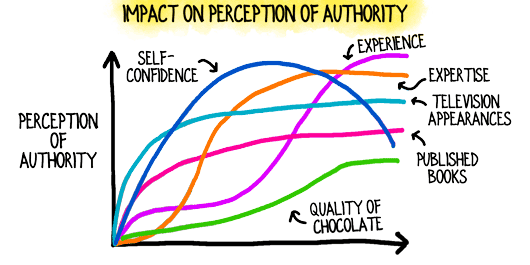How to Sound Authoritative (and Why it Matters for Your Consulting Firm)
Clients hire your consulting firm because they trust you to help them solve their problems or achieve their aspirations; because they accept your authority in your area of expertise.
Conversely, any crack in your perceived authority will weaken trust with prospects and with clients. That can trigger a precipitous drop in perceived value (and fees), likelihood to do business with your consulting firm, willingness to accept your recommendations, and eagerness to engage your firm for follow-on work.
Perception of authority, not actual authority, affects trust.
That’s why you’ve seen other consulting firms score impressive engagements although, based on their actual knowledge, experience and competence, they had no more right to win than a fluffy cat at the Westminster dog show.
Of course, as a consulting firm leader, you are used to portraying confidence in your competence. It’s a fundamental component in your ability to close contracts and to deliver results your clients happily accept.
But what about those times you’re not confident, or those times when, inexplicably, clients and prospects don’t perceive you as an authority?
Also, what about the perception of your colleagues’ authority? You may rely on others to lead parts of projects, entire projects or entire client relationships, if those associates aren’t perceived as authorities then trust, relationships and engagements are at risk.
You can sound more authoritative—credible, believable and compelling, without sounding arrogant, presumptuous or pompous.
Unfortunately, studies show that certain people start off at an advantage or disadvantage due to their gender, ethnic background, religion, socio-economic status, vocal register and even their height, perceived level of health or affection for fluffy cats.
Most of those factors you can’t control; however, the dozen distinctions below can be learned, developed and mastered.
If, for instance, you want someone in your consulting firm other than you to be able to effectively lead clients, you can evaluate them on the factors below (and others suggested in the comments), then create an improvement plan.
A Dozen Tips to Sound More Authoritative
More Authoritative
Less Authoritative
Good posture*
Slumping, bent posture
Purposeful hand gestures
No hand gestures, wringing hands
Modulated tone and volume
Monotone
Emotional stability
Tears, angry outbursts, whoops of joy
Active listening, responding to questions
Poor listening, answering wrong questions or no questions
Professional attire
Overly casual or formal attire
Effective story telling
Telling stories that are clipped, ramble, have no clear point
Good use of rhetorical devices: repetition, analogy, metaphor
Boring language, confusing or inappropriate rhetoric
Humility, valuing other perspectives along with your own
Persistent arrogance, clearly placing others’ opinions above your own*
Confident, inclusive humor
Nervous, uneasy humor*
Reference to relevant examples and personal experience
Generic or irrelevant examples, clear lack of experience
What else?
What else?
Help improve the list. What is missing?
I would also like to hear from you about differences. For instance, are there any recommendations you think should be modified or eliminated for certain people or situations?
Text and images are © 2024 David A. Fields, all rights reserved.

 David A. Fields Consulting Group
David A. Fields Consulting Group 



Ability to cite industry best practices relevant and applicable to the client situation
Agreed, VR. Much like referencing examples and experience, showing you are conversant with best practices can establish authority.
Excellent addition to the list, VR!
Follow up to meetings with resources to share, like VR points out the relevancy to content I’ve seen the ability to “teach” along the way helps.
BTW, I appreciate the nautical pun in the beginning graphic David. I got a little “red” in the face as I turned to the next page. 🙂
Another good addition, Bill. Demonstrating you have materials, assets and other relevant resources readily at hand absolutely contributes to the perception of you as an authority.
(Also, double gold stars for extending the “Left” reference another step.)
Verbal tics (like “um”), qualifiers (“I guess”, “Maybe”), unnecessary words (“I think”, “I believe”), and turning statements into questions (tone of voice going up at the end of the sentence) can all make people sound less authoritative. Example: Kim Scott in her book “Radical Candor” tells a story of her boss Sheryl Sandberg bluntly pointing out that her “ums” were making her sound stupid. Thanks for the list David.
Excellent points, Gwen. All of those cues you pointed out indicate uncertainty to the listener, which diminishes authority. One of the kindest deeds you can do for a professional friend is point out their verbal tics.
I once heard an authority in a radio interview use the word “like” so many times that I couldn’t pay any attention to his actual content. The poor interviewee was probably mortified when he listened to his own appearance later, but at the time he seemed to have, like, no, like, awareness of his, like, uhm, like problem.
Thanks for jumping into the discussion, Gwen!
Because so many of our business conversations take place in a virtual environment, good lighting and good audio enhance authority (a $15 ring light and a $60 Samson Q2U mic are amazingly better than backlit staging and webcam audio).
Should this be a factor? Repeating your words David, “no comment”.
You’re absolutely right, Rick. Fuzzy video and, worse, garbled audio, give the impression that you’re an amateur.
I’m glad you added that smart thinking to the list!
Not jumping in to start solving as soon as the first problem is named, but asking “What else?” a few times and following due diligence to ensure you have the whole picture; likewise, not racing off with the first solution proposed, but asking for more ideas and input so everyone is heard, and a better solution can be brought forth.
Well said, Jeremy. An authority has the security and self-confidence to listen more, ask more, and understand more. Jumping in too quickly can show you’re not listening, which can give the appearance that you’re not as much of an authority as you’d like to believe.
Excellent contribution, Jeremy!